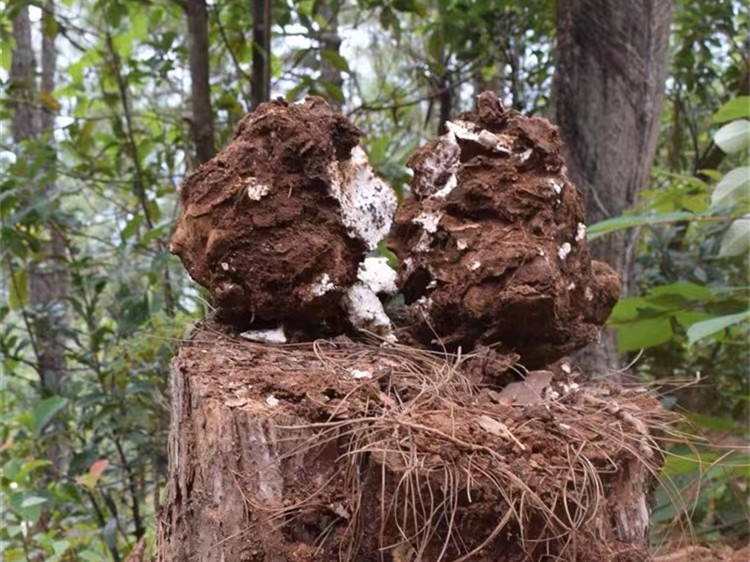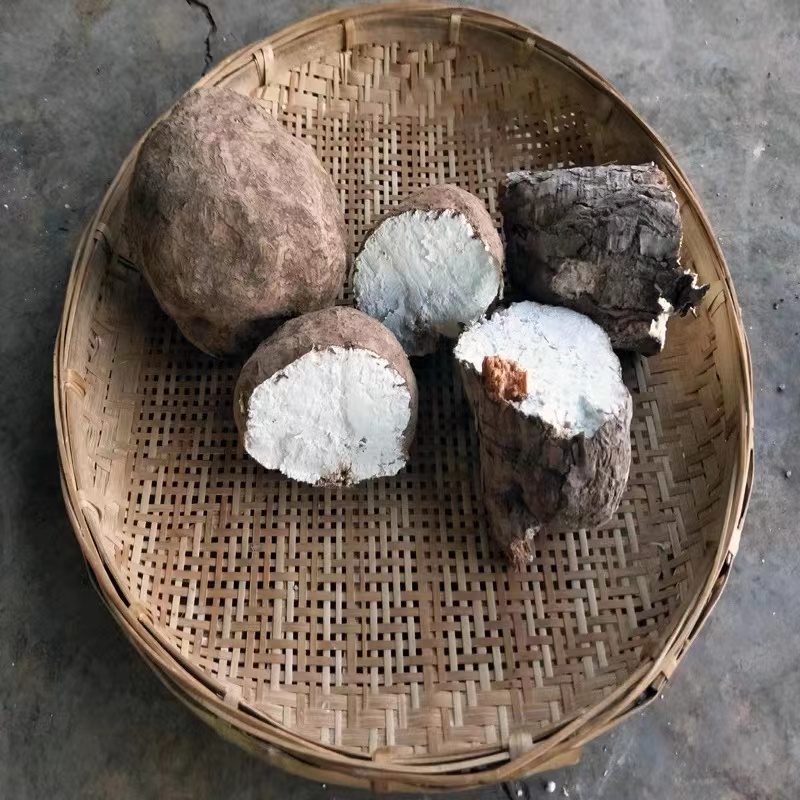Poria cocos (Fu ling), is the dried sclerotium of the fungus Poria cocos(Schw.) Wolf of the Poraceae family. It is mostly born on the roots of pine plants. When young, the mycelium is white fluff and becomes light brown. When old, it is mainly distributed in China, Japan and some countries in Southeast Asia. It’s an old and widely-used mushroom that has been in use for over two thousand years, and is the chief ingredient in about 10% of all Traditional Chinese Medicinal formulations. Pharmacological studies show that it contains an abundance of polysaccharides and other bioactive components, including triterpenoids, fatty acids, sterols and enzymes. Polysaccharides account for 84% of the sclerotium and they have a wide range of biological activities including antitumor, immunomodulation, anti-inflammation, antioxidation, anti-aging, anti-hepatitis, and antidiabetics effects. It is also often included in herbal remedies that target insomnia, fatigue, tension, and nervousness. In addition, it can promote urination and help the spleen function well. It’s also a well-known anti-microbial, and it can help with digestive issues. Traditional Chinese Medicine has long used poria cocos to treat what’s called “damp,” which can manifest as a thick fog in the brain, excess water retention in the kidneys, excessive mucus in the respiratory tract, and bloating in the digestive system. Triterpenes and polysaccharides are the two main bioactive compounds in poria cocos. It’s also a rich source of vitamins and minerals, especially calcium, which can be beneficial for bone health. Here we will talk about its benefits in detail, let’s start with the components of Poria cocos extract.
Fig:Wild Poria cocos
Components of Poria cocos extract
Poria mushrooms contained rich polysaccharides, triterpenes and fatty acids. Pachymose is the main component, accounting for 84.2%. It was also reported that β-Pachyman was the main component, accounting for 93% of dried poria. The triterpenoids include Pachymic acid, tumulosic acid, polylytic acid, porodontic acid, Dehydropachymic acid, and poricoic acid A, etc. Fatty acids like Caprylic acid and Lauric acid. Other components are Ergosterol, gum, crustacean, protein, fat, lecithin and other components.
Benefits of Poria cocos extract
Calmative
In Chinese traditional medicine, poria cocos has been used for centuries as a sedative and calming tonic. It can help reduce anxiety, tension, insomnia, tinnitus (ringing in the ears), sleep problems, fluid retention, urination problems, and tumors. It can also promote blood sugar regulation, relieve pain and swelling, and support digestion. The triterpenoids in poria cocos extract have also been shown to help improve depression-like behavior and restore brain derived neurotrophic factor and nerve growth factor levels in rats.
Immune System Support
Mushrooms are natural adaptogens that bring immune cells and hormones back into balance. This is especially important when you are training hard and the effects of oxidative stress, free radical damage and inflammation are having a taxing effect on the body. Poria cocos has been used holistically for thousands of years, and studies have shown that the polysaccharide in this mushroom is responsible for a number of health benefits. These include reducing inflammation, antioxidant protection, supporting healthy inflammatory responses and enhancing the immune response. A variety of metabolites are found in Poria cocos including water-soluble polysaccharides, triterpenoid saponins and pycnogenol, which have been shown to regulate gut microbiota by increasing the ratio of probiotic bacteria. In addition, they reduce inflammatory factors and blood lipid levels to prevent atherosclerosis. These polysaccharides have also been shown to enhance immune system activity against lung cancer.
Insomnia Support
In traditional Chinese medicine, poria cocos is commonly used as an insomnia support and digestive aid. It’s an herbal tincture that can be taken sublingually or mixed into beverages to help promote a restful night’s sleep. It also helps reduce the symptoms of anxiety, such as restlessness, fatigue, tension, and nervousness. In addition to its anxiolytic and sedative properties, poria cocos has been shown to increase the activity of GABAA receptors, which are key in promoting sleep. Additionally, it has been reported to reduce the inflammatory response in the brain, the choline contained in poria cocos can enhance and improve the brain memory function and has a pharmacological effect on the brain.
Skin benefits
Poria Cocos mushroom is a skin-friendly fungus that has been used for centuries in East Asian medicine and beauty products. It contains rich Beta Glucan, organic acids and proteins, these components offer natural anti-aging properties and can effectively inhibit the activity of tyrosinase, and almost no irritation to the skin. Poria polysaccharide has been shown to have antibacterial, and anti-inflammatory activity, and had inhibitory effects on Staphylococcus aureus, Escherichia coli and Proteus, making it a promising ingredient for treating a variety of skin concerns, including improving skin elasticity, reducing blemishes, acne, eczema, and wrinkles.
Studies have also shown that Poria Cocos mushrooms can help protect the skin from environmental pollutants and damage caused by exposure to UV rays. Its antioxidant properties are thought to protect the skin from free radicals and minimize signs of aging. All in all, this unique fungus appears to be a promising skincare ingredient with powerful health benefits.




